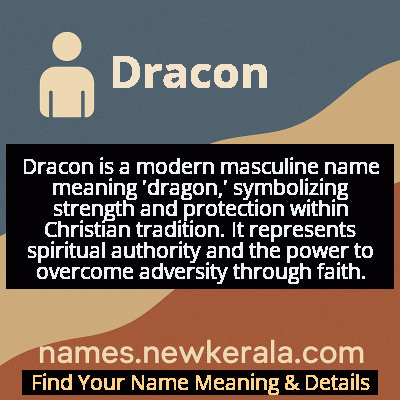Dracon Name Meaning & Details
Origin, Popularity, Numerology Analysis & Name Meaning of Dracon
Discover the origin, meaning, and cultural significance of the name DRACON. Delve into its historical roots and explore the lasting impact it has had on communities and traditions.
Name
Dracon
Gender
Male
Origin
Christian
Lucky Number
1
Meaning of the Name - Dracon
Dracon is a modern masculine name meaning 'dragon,' symbolizing strength and protection within Christian tradition. It represents spiritual authority and the power to overcome adversity through faith.
Dracon - Complete Numerology Analysis
Your Numerology Number
Based on Pythagorean Numerology System
Ruling Planet
Sun
Positive Nature
Leaders, ambitious, highly driven, self-reliant, innovative.
Negative Traits
Overly aggressive, domineering, impatient, selfish.
Lucky Colours
Red, orange, gold.
Lucky Days
Sunday.
Lucky Stones
Ruby, garnet.
Harmony Numbers
2, 3, 9.
Best Suited Professions
Entrepreneurs, managers, engineers.
What People Like About You
Courage, determination, leadership.
Famous People Named Dracon
Dracon of Athens
Ancient Lawgiver
Created Athens' first written legal code, known for its harsh punishments
Saint Dracon
Christian Martyr
Early Christian martyr venerated in Eastern Orthodox tradition
Dracon Vondellar
Modern Author
Contemporary fantasy writer known for dragon-themed literature
Name Variations & International Equivalents
Click on blue names to explore their detailed meanings. Gray names with will be available soon.
Cultural & Historical Significance
In modern Christian naming practices, Dracon has been reclaimed as a name representing spiritual strength and the triumph of faith over adversity. The dragon symbolism, while complex in Christian tradition, has been reinterpreted as representing the power of Christ over evil forces. This reflects a broader trend in contemporary Christianity where traditionally 'pagan' symbols are being reinterpreted through a Christian theological lens, making Dracon a name that bridges ancient symbolism with modern spiritual meaning.
Extended Personality Analysis
Individuals named Dracon are often perceived as possessing strong leadership qualities, determination, and protective instincts. They tend to be natural leaders who approach challenges with strategic thinking and unwavering resolve. Their personality is frequently characterized by a combination of strength and wisdom, with an ability to command respect while maintaining a sense of justice and fairness in their dealings with others.
Dracons typically exhibit a complex blend of intensity and loyalty. While they may appear formidable or reserved at first, those who earn their trust discover deeply committed individuals who protect and support their loved ones with fierce dedication. They often possess strong convictions and are not easily swayed from their principles, making them reliable but sometimes uncompromising. This combination of strength, intelligence, and protective nature makes them natural in roles requiring authority and responsibility.
Modern Usage & Popularity
In contemporary usage, Dracon has emerged as a distinctive masculine name that appeals to parents seeking powerful, mythological names with Christian significance. While not among the most popular names, it has seen steady growth in usage since the early 2000s, particularly among families interested in fantasy literature and strong biblical symbolism. The name is most common in English-speaking countries and Eastern European Christian communities, where dragon mythology has been integrated into local saint veneration traditions. Modern parents often choose Dracon for its unique sound and the positive attributes of strength, protection, and spiritual authority it conveys.
Symbolic & Spiritual Meanings
Symbolically, Dracon represents power, protection, and spiritual warfare. The dragon imagery connects to both the serpent of Genesis and the dragon of Revelation, creating a rich tapestry of meaning that encompasses both temptation and triumph over evil. In Christian symbolism, it can represent the power of faith to overcome adversity, drawing from stories of saints who defeated dragons as metaphors for conquering sin and heresy. The name also carries connotations of guardianship, wisdom, and divine authority, making it a powerful choice that speaks to both earthly strength and spiritual protection.

